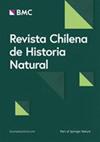Historical and current knowledge of the Magellanic tuco-tuco Ctenomys magellanicus in Patagonia and Tierra del Fuego, South America
IF 1.4
4区 环境科学与生态学
Q3 BIODIVERSITY CONSERVATION
引用次数: 0
Abstract
Abstract Background I review the natural history of the tuco-tuco Ctenomys magellanicus in Patagonia and Tierra del Fuego, southernmost geographic regions shared by Argentina and Chile. By natural history I mean both historical records and ecological features of this gregarious burrowing rodent. Methods and results I conducted a selective review of the natural history of C. magellanicus , as recorded in mainstream journals and proceedings, landmark monographs and books, and internet sources. I report results on: (a) Original description, (b) Diversity and distribution, (c) Life history, (d) Interactions with plants and herbivorous competitors, (e) Interactions with predators other than humans, (f) Interactions with humans, and (g) Abundance and conservation. I also enter the anthropology field, but I only touch the archeology field. Although this review is not on the systematics of C. magellanicus , I do provide an updated overview of the phylogenetics-based taxonomy of the genus where it belongs. Discussion There is a rather large body of literature on C. magellanicus, comprising the fields of anthropology, archeology, biogeography, biology, ecology, and systematics. These areas are broadly covered but thinly treated, offering interesting opportunities for further research. For instance, on adaptation, evolution, and environmental impact of the southernmost burrowing rodent in the world and its cultural impact on vanishing native peoples, especially the Selk’nam.南美巴塔哥尼亚和火地岛麦哲伦巨蜥的历史和现状
摘要背景对阿根廷和智利最南端地理区域巴塔哥尼亚和火地岛的麦哲伦鹬(Ctenomys magellanicus)的自然历史进行了研究。我说的自然史是指这种群居穴居啮齿动物的历史记录和生态特征。方法与结果对主流期刊和论文集、具有里程碑意义的专著和书籍以及网络资源中记录的麦哲伦(C. magellanicus)自然史进行了选择性回顾。我报告的结果是:(a)原始描述,(b)多样性和分布,(c)生活史,(d)与植物和草食性竞争对手的相互作用,(e)与人类以外的捕食者的相互作用,(f)与人类的相互作用,以及(g)丰度和保护。我也进入人类学领域,但我只接触考古领域。虽然这篇综述不是关于麦哲伦的系统学,但我确实提供了它所属属的基于系统发育的分类的最新概述。关于麦哲伦虫的文献相当多,包括人类学、考古学、生物地理学、生物学、生态学和系统学等领域。这些领域被广泛覆盖,但研究较少,为进一步研究提供了有趣的机会。例如,关于世界上最南端的穴居啮齿动物的适应、进化和环境影响,以及它对正在消失的土著民族,特别是塞尔克南人的文化影响。
本文章由计算机程序翻译,如有差异,请以英文原文为准。
求助全文
约1分钟内获得全文
求助全文
来源期刊

Revista Chilena de Historia Natural
环境科学-生态学
CiteScore
2.50
自引率
18.20%
发文量
9
审稿时长
>36 weeks
期刊介绍:
Revista Chilena de Historia Natural (RCHN) publishes original research dealing with past and present phenomena from organismic to higher levels of biological organization, considering both empirical and theoretical studies on all kinds of taxa and environments.
The major areas covered by RCHN are: botany and zoology; physiological and behavioral ecology; population biology; community and ecosystem ecology; systematics, biogeography and evolution.
 求助内容:
求助内容: 应助结果提醒方式:
应助结果提醒方式:


